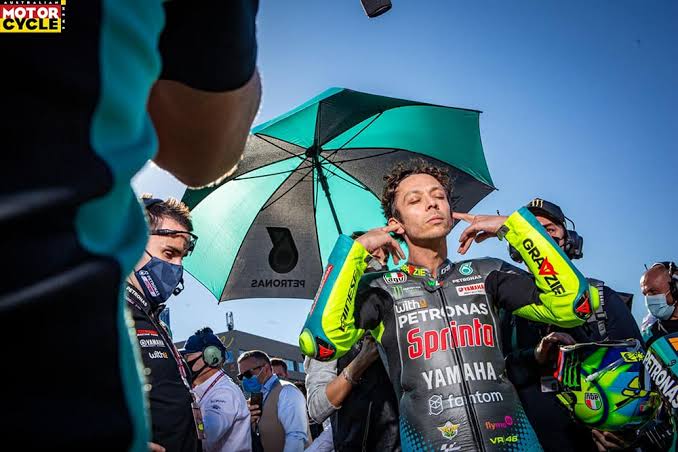
Valentino Rossi: Does His Post-MotoGP Career Jeopardize His Legendary Legacy?
Valentino Rossi, a name synonymous with MotoGP, has captivated fans for over two decades with his exceptional talent and charismatic personality. As he transitions into car racing after his retirement from two-wheel racing, the motorsport community is abuzz with mixed reactions. Some fans celebrate his new journey, while others express concern that his involvement in car racing could tarnish the illustrious legacy he built in MotoGP. This article explores the complexities of Rossi’s career transition and the implications for his enduring status as a racing legend.
The End of an Era
When Rossi announced his retirement from MotoGP at the end of the 2021 season, the announcement resonated deeply with fans worldwide. With seven premier-class titles and an unparalleled 115 race wins, Rossi’s achievements are monumental. His infectious enthusiasm, unique style, and competitive spirit made him an icon, not just in Italy, but across the globe.
However, retirement often invites reflection on a rider’s legacy. For Rossi, the concern arises from how his post-retirement activities may shape public perception of his career. As he moves into car racing, some fans feel this shift might distract from the unparalleled achievements he made in the world of motorcycles.
The Shift to Four Wheels
Rossi’s decision to pursue a career in car racing has been met with both excitement and skepticism. Competing in the GT World Challenge Europe, he has taken on a new challenge that allows him to showcase his skills in a different arena. While many applaud his versatility, others argue that this transition could dilute the significance of his MotoGP career.
Critics point out that Rossi’s brand was built on motorcycle racing, and any move away from that world risks alienating fans who feel a deep connection to his two-wheeled legacy. They worry that his newfound focus on cars could overshadow the remarkable accomplishments he achieved on bikes, leading to a perception that he is no longer the “Doctor” of MotoGP.
Legacy and Public Perception
A major factor in the discussion about Rossi’s legacy is how fans perceive greatness in sports. For many, a career is defined by a singular focus—dedicating oneself entirely to mastering one discipline. Rossi’s shift to car racing raises questions: Can a multi-discipline athlete maintain the same level of reverence in their original sport? Or does branching out signify a lack of commitment to the foundation that built their legacy?
Fans expressing concern often reference other athletes who have made similar transitions, suggesting that success in one sport does not guarantee a respected status in another. They fear that Rossi’s exploits in car racing may lead to a reevaluation of his MotoGP achievements, potentially framing him as a “jack of all trades, master of none.”
The Impact of Social Media
In today’s digital age, social media amplifies every opinion, contributing to the polarized views surrounding Rossi’s transition. Platforms like Twitter and Instagram are filled with fans voicing their support or disappointment. Some celebrate Rossi’s courage to explore new challenges, while others lament what they perceive as a betrayal of his roots.
This dynamic can create a feedback loop, where vocal criticism can overshadow positive sentiments, leading to a skewed perception of Rossi’s actions. In many ways, social media reflects the broader tension between nostalgia for the past and excitement for new endeavors—a dichotomy that is particularly pronounced for a figure as iconic as Rossi.
The Role of VR46
Another significant aspect of Rossi’s legacy is his role in establishing the VR46 brand and racing team. His commitment to nurturing young talent in MotoGP has earned him respect as a mentor and team owner. While Rossi’s car racing endeavors draw attention, many fans believe that his work with VR46 holds equal importance in solidifying his legacy.
By actively contributing to the sport through his team, Rossi demonstrates that his passion for racing extends beyond personal competition. However, some argue that his focus on car racing might divert attention and resources away from VR46, potentially jeopardizing the future success of the team and its riders.
A Legacy in Evolution
It is essential to recognize that legacies are not static; they evolve over time. Rossi’s career trajectory, including his foray into car racing, reflects a natural progression for an athlete who has spent a lifetime at the pinnacle of motorsport. While some fans may view this evolution skeptically, others see it as a testament to Rossi’s enduring love for racing, regardless of the vehicle.
Moreover, Rossi’s charisma and persona have always transcended the sport itself. His ability to connect with fans, promote the sport, and inspire the next generation of racers remains a vital part of his legacy. As he explores new avenues in racing, Rossi continues to embody the spirit of competition that has defined his career.
Conclusion: Embracing the Complexity
Valentino Rossi’s retirement from MotoGP and subsequent involvement in car racing brings forth a complex mix of emotions among fans. While concerns about the impact on his legacy are valid, it is crucial to embrace the multifaceted nature of Rossi’s career. His journey is a reminder that greatness can take many forms, and exploring new challenges does not diminish past achievements.
As fans, it’s essential to celebrate Rossi’s contributions to MotoGP while also allowing him the freedom to evolve as a racer. Ultimately, Rossi’s legacy will be defined not only by his victories and championships but by his passion for racing and the joy he has brought to millions around the world. The story of Valentino Rossi is far from over; it is simply entering a new chapter—one that fans can choose to embrace rather than critique.





